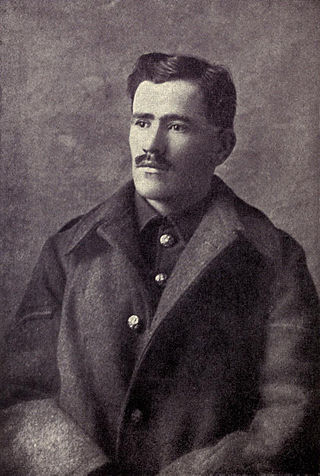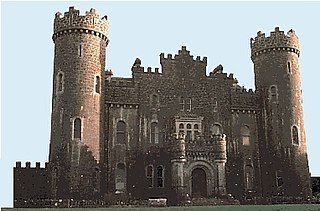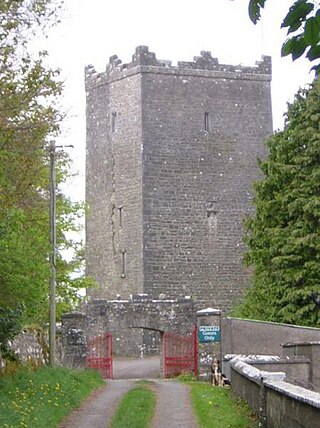Liam Nevin | |
|---|---|
 Nevin speaking in Donaghpatrick in 2013 | |
| Born | Liam Nevin 1 March 1951 Maynooth, Ireland |
Liam Nevin is an Irish writer (born 1951), known for his books touching on tobacco-growing in Ireland and on Irish rural childhood.
Liam Nevin | |
|---|---|
 Nevin speaking in Donaghpatrick in 2013 | |
| Born | Liam Nevin 1 March 1951 Maynooth, Ireland |
Liam Nevin is an Irish writer (born 1951), known for his books touching on tobacco-growing in Ireland and on Irish rural childhood.
Nevin was born in 1951 and grew up in Maynooth, County Kildare, the second youngest of eight children. He moved to London in 1972, where he now lives and works. [1]
While researching a family tree, Nevin came across papers detailing the growing of tobacco at Randlestown House outside Navan, County Meath, which was the family seat of Sir Nugent Everard. Nevin compiled the documents to produce The Tobacco Fields of Meath which details the difficulties and challenges faced by Sir Nugent and the estate's under-steward, Liam's grandfather John Nevin, in their tobacco experiment. The book also mentions the history of tobacco-growing in Ireland and country life in the early 20th century.
Nevin's second book was published in September 2016 and is a fictionalised version of childhood in rural Ireland in the 1960s. [2]

Francis Edward Ledwidge was a 20th-century Irish poet. From Slane, County Meath, and sometimes known as the "poet of the blackbirds", he was later also known as a First World War war poet. He befriended the established writer Lord Dunsany, who helped with publication of his works. He was killed in action at Ypres in 1917.

Clonyn Castle also known as Delvin Castle, is a Victorian country house situated in Delvin, County Westmeath, Ireland some 18 km from Mullingar along the N52. It is a square, symmetrical, two-storey castle-like building of cut limestone with four tall, round corner towers at each corner. The interior has a large two-storey hall with a gallery and arcading. It was one of the last Victorian baronial castles to be built in Ireland.

Sir Nugent Talbot Everard, 1st Baronet was an Irish senator nominated to the 1922 Seanad Éireann.
Sir Tristram Beresford, 3rd Baronet was an Anglo-Irish soldier, politician and baronet.

William Nugent (1550–1625) was a Hiberno-Norman Irish rebel in the 16th century Kingdom of Ireland, brother of Christopher, fourteenth baron of Delvin, and the younger son of Richard Nugent, thirteenth baron of Delvin, from whom he inherited the manor and castle of Ross in County Meath. His mother was Elizabeth Preston, daughter of Jenico Preston, 3rd Viscount Gormanston, and widow of Thomas Nangle, feudal Baron of Navan.
The High Sheriff of Westmeath was the British Crown's judicial representative in County Westmeath, Ireland from its creation under The Counties of Meath and Westmeath Act 1543 until 1922, when the office was abolished in the new Free State and replaced by the office of Westmeath County Sheriff. The sheriff had judicial, electoral, ceremonial and administrative functions and executed High Court Writs. In 1908, an Order in Council made the Lord-Lieutenant the Sovereign's prime representative in a county and reduced the High Sheriff's precedence. However the sheriff retained his responsibilities for the preservation of law and order in the county. The usual procedure for appointing the sheriff from 1660 onwards was that three persons were nominated at the beginning of each year from the county and the Lord Lieutenant then appointed his choice as High Sheriff for the remainder of the year. Often the other nominees were appointed as under-sheriffs. Sometimes a sheriff did not fulfil his entire term through death or other event and another sheriff was then appointed for the remainder of the year. The dates given hereunder are the dates of appointment. The following is an incomplete list: all addresses are in County Westmeath unless stated otherwise.
Lucas More Plunket of Killeen, County Meath, styled Lucas Môr, tenth lord Killeen, created Earl of Fingall on 26 September 1628, was an Irish peer.
Sir Robert Dillon of Riverston was an Irish lawyer, judge, and politician. He came from a family with a distinguished record of judicial service. He pursued a successful career as a judge, which was, however, dogged by accusations of corruption and other serious wrongdoing, of which the worst was that he had falsely condemned Nicholas Nugent, another judge and rival, to death. Sir Robert Dillon, the subject of this article, must not be confused with an earlier Sir Robert Dillon of Newtown, his grand-uncle, who was also Chief Justice of the Irish Common Pleas.
The High Sheriff of Meath was the British Crown's judicial representative in County Meath, Ireland, from the conquest until 1922, when the office was abolished in the new Free State and replaced by the office of Meath County Sheriff.
Sir Thomas Luttrell was a wealthy Anglo-Irish landowner of the sixteenth-century Irish Pale. He was also a distinguished lawyer and judge who held the offices of King's Serjeant, Solicitor General for Ireland and Chief Justice of the Irish Common Pleas.
Nicholas St. Lawrence, 9th Baron Howth (c.1550–1607) was a leading member of the Anglo-Irish nobility in the late sixteenth and early seventeenth centuries. Despite openly professing his Roman Catholic faith, he enjoyed the trust of Elizabeth I and of successive Lord Deputies of Ireland, and was even forgiven by the English Crown for signing a petition protesting against the enforcement of the Penal Laws.
Sir Thomas Cusack (also spelt Cusacke or Cusake) (1490–1571) was an Anglo-Irish judge and statesman of the sixteenth century, who held the offices of Master of the Rolls in Ireland, Lord Chancellor of Ireland, and Chancellor of the Exchequer of Ireland, and sat in the Irish House of Commons. He was one of the most trusted and dependable Crown servants of his time, although he led a somewhat turbulent private life.
Sir Lucas Dillon, also called Luke, was a leading Irish barrister and judge of the Elizabethan era who held the offices of Attorney General for Ireland and Chief Baron of the Irish Exchequer. He supported the Lord Deputy Henry Sidney in the cess controversy and the Lord Deputy John Perrot in the Desmond Rebellions. He was held in high regard by Queen Elizabeth, but was accused by his enemies of corruption and maladministration.
Richard Nugent, 2nd Earl of Westmeath was an Irish nobleman.
Richard Segrave (c.1540–1598) was an Irish judge, remembered chiefly for sitting in judgement on his colleague Nicholas Nugent, who was the only Irish judge ever to be hanged for treason by the Government which appointed him.
Robert Cusack (c.1516–1570) was an Irish judge of the sixteenth century, who held office as a Baron of the Court of Exchequer (Ireland). He was strongly recommended for the position of Chief Baron of the Irish Exchequer, but was passed over for the office, though with a promise of future preferment. His career was cut short by his premature death.
Sir William Talbot, 3rd BaronetPC (Ire) was the last of the Talbot baronets of Carton: his title was forfeited on account of his loyalty to King James II of England. He was an Irish politician and judge, who served briefly as Master of the Rolls in Ireland.
James Dillon, 1st Earl of Roscommon fought for the crown in the Nine Years' War. He was ennobled despite being a Catholic after his son Robert turned Protestant.

Anthony "Tony" Holten was an Irish author, historian, stroke advocate, former mechanic and marine engineer.
Sir John Dongan, 2nd Baronet (1603–1650) was a member of the Irish Parliament.